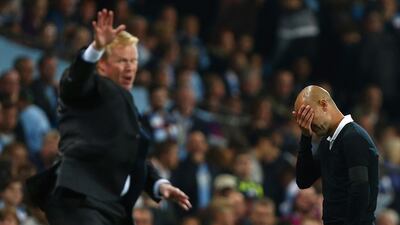A former Manchester United player scored against Manchester City. A former Liverpool player scored against Everton.
Perhaps it was that sort of night at the Etihad Stadium, closely contested, controversial and coated in Schadenfreude, a game to provide proof that the nearest are rarely the dearest where derby rivalries are concerned.
City and Everton registered a goal, a red card and a point apiece. Raheem Sterling cancelled out Wayne Rooney’s strike. Morgan Schneiderlin levelled the numbers at 10 apiece after Kyle Walker had been sent off.
Read more from Richard Jolly
Guardiola's fresh opportunity to get one over on Koeman
With youth, power and pace, Man City now shaped in Guardiola's image
Man City's legacy now becoming clearer under Guardiola
Ronald Koeman again showed his capacity to thwart his former Barcelona teammate Pep Guardiola.
The watching Jose Mourinho and Sir Alex Ferguson were treated to an eventful evening.
Rooney and Guardiola ended arm in arm, seemingly a mutual admiration society amid the acrimony. There was much to admire. A comeback was proof of City’s spirit and Guardiola’s fertile mind, the manager reconfiguring them time and again as he and Koeman traded tactical moves.
Sterling came on as a right wing-back, ended up in the No. 10 position, missed chances wastefully and took one clinically.
“He is a guy who prefers to play in the middle than wide,” Guardiola said.
Meanwhile, Koeman’s willingness to think outside the box was apparent as, defending a 1-0 lead, he opted to replace centre-back Ashley Williams with attacking midfielder Davy Klaassen.
The result would suggest his gamble was not justified but he was 10 minutes away from a spectacular success. Not for the first time, Guardiola could rue Koeman’s ability to second-guess him.
“I think the gameplan was perfect,” said the Dutchman modestly.
He outlined his ideas. “We left [Nicolas] Otamendi on the ball,” he said, rationalising the centre-back could do least damage. He concentrated on others.
Long unfashionable, man-marking has made a return to the English game. First Ander Herrera and then Idrissa Gueye took on the role of Eden Hazard’s personal sentry last season. Koeman extended that policy with Gueye taking a particular interest in David Silva and Schneiderlin policing De Bruyne.
“We had good man-marking against [Kevin] De Bruyne and [David] Silva,” Koeman added.
Schneiderlin’s two cautions, incidentally, came for challenges on Sergio Aguero, not the supposed centre of his attentions.
If the worry for City is that Koeman has provided with a blueprint in how to play against them, the reality is that few will be able to do it as well.
Few of his managerial counterparts possess such an accomplished pair of defensive midfielders.
Koeman went like-for-like, pitting a defensive 3-5-2 against City’s more attacking 3-5-2. Every shape has its shortcoming and this is a system that lacks width in the final third, something Guardiola sought to rectify with his 10 men in the second half.
Apart from occasional combinations of the old firm of Silva and Aguero, City had little to show for their possession before then.
Everton were well drilled, a team where each player knew his job and most did them expertly. It was typical of the bittersweet nature of the night that Mason Holgate erred for the equaliser, with a poor header.
The right wing-back had been excellent, keeping Leroy Sane quiet. Perhaps the game’s outstanding figure was Phil Jagielka, who made a goal-line clearance from Aguero and a perfectly-judged last-ditch challenge on the Argentinian.
Amid the focus on the new, an old-timer was terrific. There were echoes of his outstanding performance at the Etihad in Everton’s 2009 win.
There was a point in winter when the captain played one minute of league football in 10 weeks. He was linked with a move to David Moyes’ sorry Sunderland.
The renaissance of one of Everton’s great 21st-century servants is a triumph of character.
Another veteran with something to savour was Rooney. His 200th Premier League goal was the culmination of a career’s work. That it took him until January 21 to register two last season, and that he scored his second on August 21 this year, is an indication of how his fortunes have changed with his club.
Yet the outstanding forward on show was Dominic Calvert-Lewin. While Koeman reiterated his desire for a new striker, the youngster suggested he may not need one. A fearless frontrunner brought incision.
His was the low cross Rooney converted; he was the man caught, albeit unintentionally, by Walker when the right-back was sent off.
The newcomer’s first career red card came for two bookings in as many minutes, the first justified, the second seemingly from a mistaken belief he had elbowed Calvert-Lewin, rather than simply backing into him.
Ederson may plead misfortune, too – he had a fraction of a second to adjust his feet when Rooney struck – but it represented an inauspicious start.
Claudio Bravo had an unfortunate habit of conceding to the first shot on target. His successor suffered a similar problem.
It was, Guardiola was quick to agree, like last season. So was the scoreline.
“Like always we are analysed on the result and the result was not good,” he stated.
Koeman disagreed. “A good point,” he beamed.


